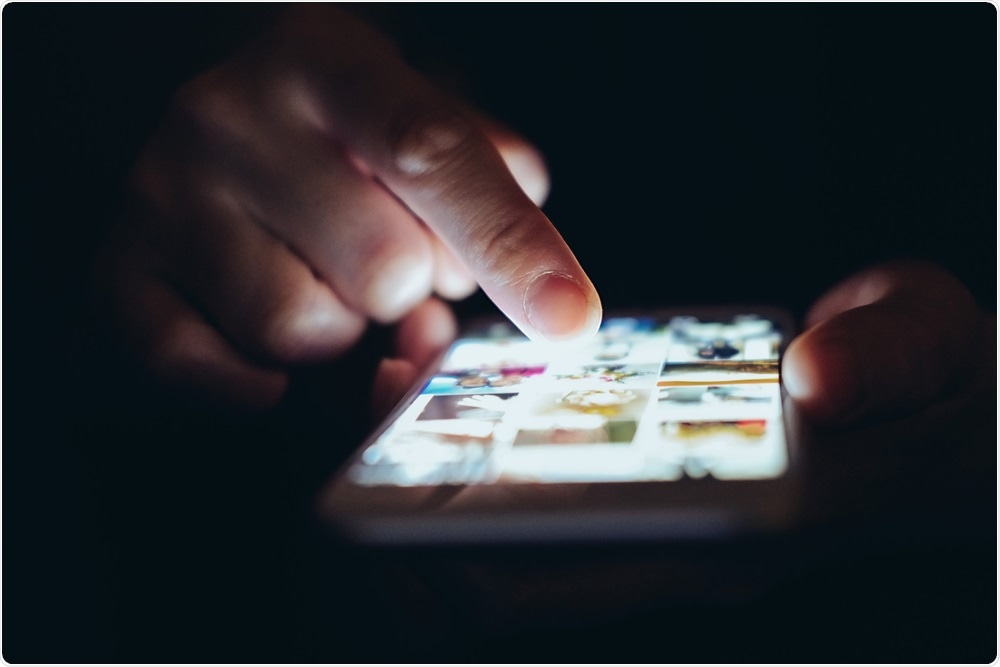It is not uncommon for people who wake up in the middle of the night to check their smartphones for the time or notifications. Many complain that this sudden burst of acute light often makes it difficult to fall back asleep. However, a new study from researchers at Northwestern University has found that this phenomenon does not affect circadian rhythm.
The new study titled, “Distinct ipRGC subpopulations mediate light's acute and circadian effects on body temperature and sleep,” was published in the latest issue of the journal eLife.
 Kakoki | Shutterstock
Kakoki | Shutterstock
The acute bursts of light from smartphones in dark rooms are known as short pulses of light. For the study, the researchers looked at the effects of these pulses of light on the brain and their effects on sleep. They noted that separate parts of the brain are responsible for processing signals for short pulses of light and long exposures to light.
Lead researcher on this study Tiffany Schmidt explained that earlier it was believed that all the light signals reaching the brain via the eyes are processed only at the suprachiasmatic nucleus (SCN) of the brain which is also responsible for the sleep-wake cycle or the circadian rhythm of the brain.
Prior to the widespread use of electricity, our exposure to light and darkness occurred in a very predictable pattern. But light has become very cheap. We all have smartphones, and their screens are very bright. We're all getting exposed to light at the wrong times of day. It's becoming more important to understand how these different types of light information are relayed to the brain.”
Tiffany Schmidt, Lead Researcher, Northwestern University
When light enters the eye, it hits special cells at the back of the retina called the intrinsically photosensitive retinal ganglion cells (ipRGCs). A signal is then transduced to nerve cells that carry the message to the brain.
Previously, scientists believed that these signals traveled to the SCN region of the brain. The SCN, which is also called the circadian pacemaker of the brain, can regulate the circadian rhythm.
“Light information comes into the SCN, and that's what synchronizes all of the body's clocks to the light/dark cycle. This one master pacemaker makes sure everything is in sync,” said Schmidt.
The new study shows that the SCN is not the only region that receives light messages. To prove this, Schmidt and her team used genetically modified mouse models. These mice had their genes tweaked so that they had ipRGCs projecting to the SCN only and not to any other region of their brains.
The team writes that mice are normally nocturnal and when there is light, they tend to fall asleep. These genetically modified mice whose SCN regions of the brains alone received the light information, however, stayed awake when exposed to the light, found the researchers.
When these mice were exposed to short pulses of light (akin to pulses of light for humans using smartphones in the middle of the night), they remained awake. This means that the short pulses of light did not affect the wakefulness of the mice.
Short term exposure to light also did not alter the body temperatures of the mice and their sleep-wake cycles and circadian rhythms remained intact with short pulses of light.
The researchers explain that this study shows that one night of smartphone activity in the dark may affect sleep on that night and may make a person feel drowsy the next day. Despite this, there are no long term effects on a person’s sleeping patterns.
If these two effects - acute and long-term light exposure - were driven through the same pathway, then every minor light exposure would run the risk of completely shifting our body's circadian rhythms.”
Tiffany Schmidt, Lead Researcher, Northwestern University
Thus, the researchers were sure that there are multiple pathways through which the light information reaches different parts of the brain and these areas as of yet are not clearly mapped said Schmidt.
She added that a small amount of light exposure at the night may help raise alertness. This could be useful for shift workers such as doctors, emergency personnel, shift workers and nurses. These light exposures may help retain alertness but not change or harm the circadian rhythm in the long run, she explained.
However, “Light at the wrong time of day is now recognized as a carcinogen. We want people to feel alert while they are exposed to light without getting the health risks that are associated with shifted circadian rhythms, such as diabetes, depression and even cancer,”warns Schmidt.
The study was supported financially by the National Institutes of Health and others. It was a collaborative work between Schmidt and Fred Turek, the Charles and Emma Morrison Professor of Neurobiology in Weinberg, and Samer Hattar, section leader at the National Institute of Mental Health.
Journal reference:
Rupp, A. C., et al. (2019) Distinct ipRGC subpopulations mediate light’s acute and circadian effects on body temperature and sleep. bioRxiv [pre-print]. https://doi.org/10.1101/496323.